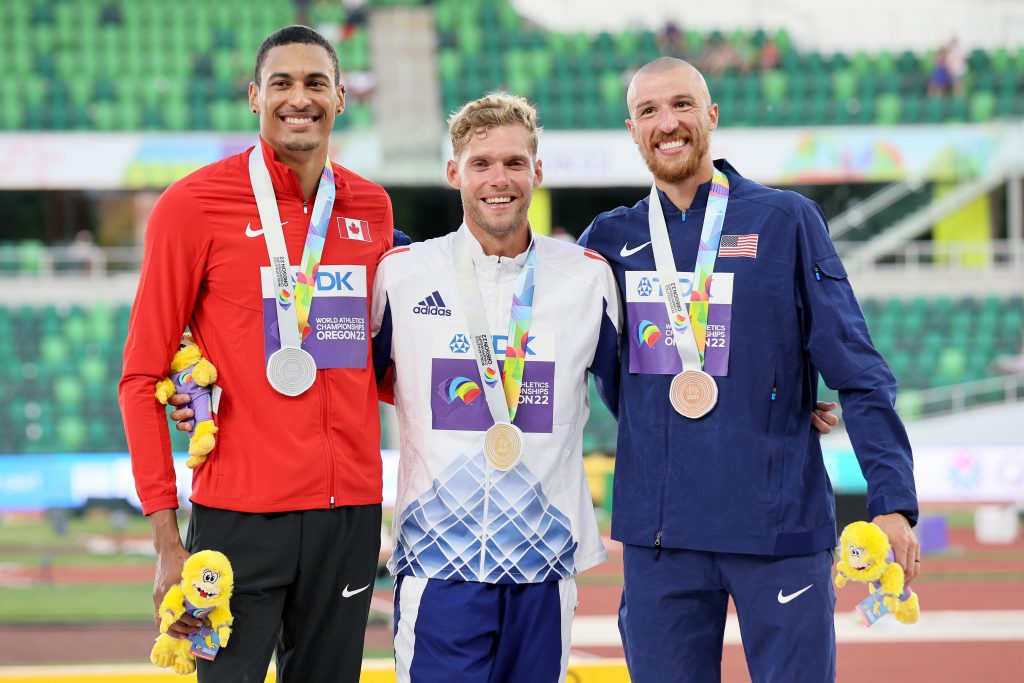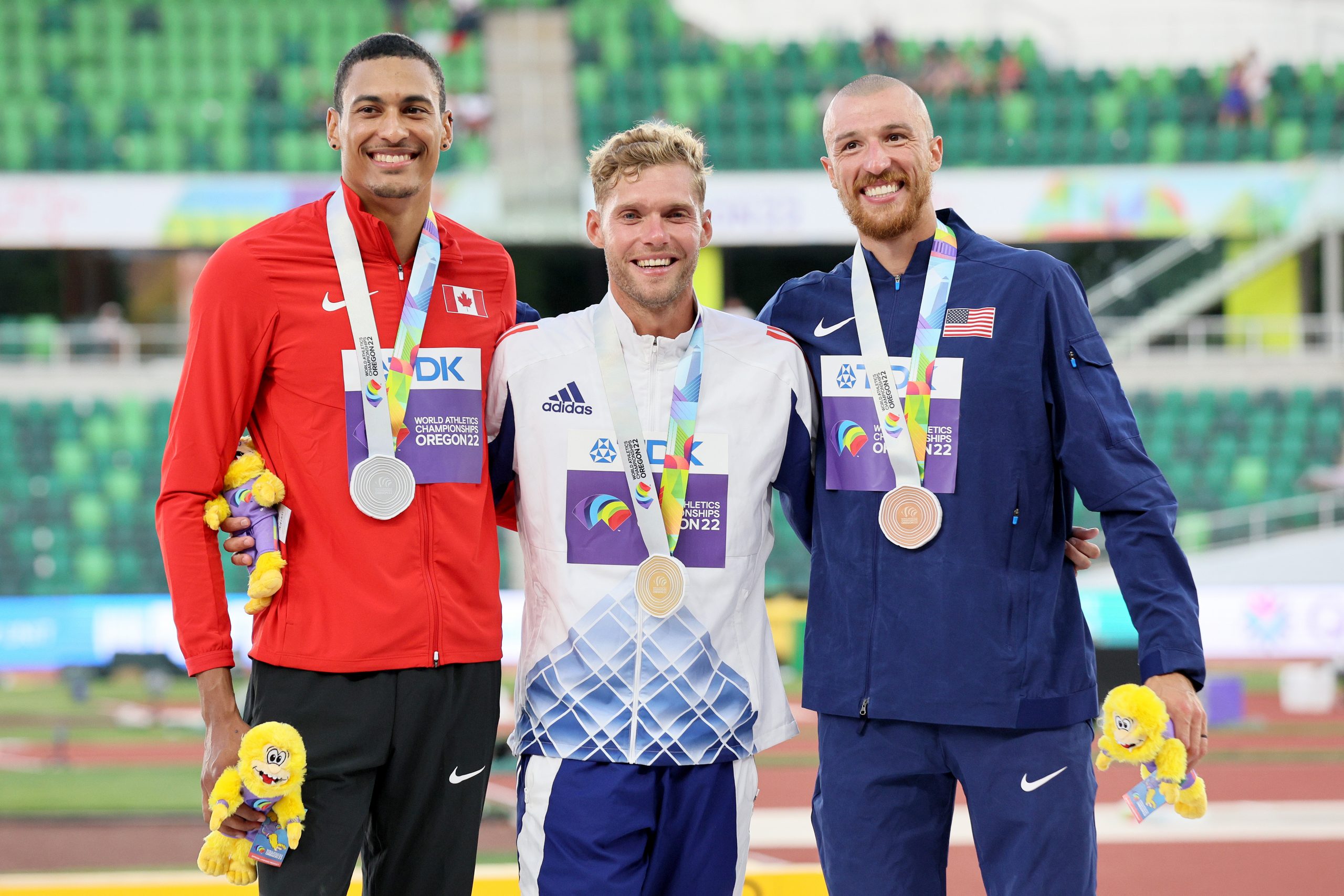In a field that included the Olympic champion, the world champion and the world record holder, in the home of Ashton Eaton’s first world record a decade earlier in 2012, would the first World Championships decathlon on US soil repeat the drama of the midnight decathlon at the 2019 World Championships in Doha?

100M
A chilly start to the decathlon – it was just 16 degrees in Hayward Field – put paid to any expectations of fast times. The exception to that was the young king of the North, Sander Skotheim of Norway, who embraced the chill to run a PB of 10.88s in the first heat. Dan Golubovic of Australia also made it under 11 seconds, and the defending champion Niklas Kaul of Germany was not too far off his lifetime best with a run of 11.22s, just behind the 2019 silver medallist Maicel Uibo of Estonia in 11.14s.
Andy Preciado of Ecuador pulled up after a few metres, jogged back to the start and didn’t take any further part in the competition. Ondřej Kopecký had also scratched from the competition, a shame for Roman Šebrle’s charge who has improved so much this season.
Heat two didn’t deliver any surprises, but Johannes Erm’s run of 10.94s did suggest he might be in good form and able to improve on his scores of 8132 and 8250 this season.
And then the speedsters in the final heat. The fastest man in decathlon history, Damian Warner of Canada, led a procession of the quickest men in the field – Warner 10.27s, Pierce LePage of Canada 10.39s, Ash Moloney of Australia 10.49s and Ayden Owens-Delerme of Puerto Rico 10.52s. All as expected, and all down a little on their best given the cold. Just behind them, Zach Ziemek of USA ran 10.57s – just two hundredths off his best in chilly conditions.
The world record holder Kevin Mayer ran 10.62s behind Ziemek, a similar margin down on his best to Warner. So far, so steady from the big two.
After one event:
- Damian Warner 1030
- Pierce LePage 1001
- Ash Moloney 977
- Ayden Owens-Delerme 970
- Zach Ziemek 959
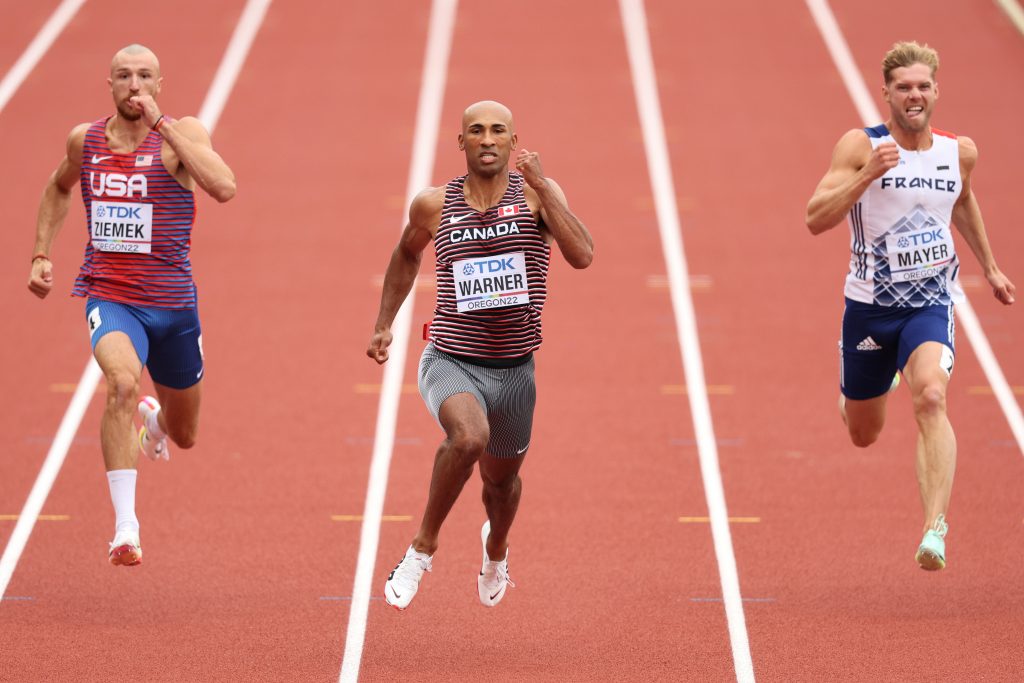
LONG JUMP
With the air still cool and the wind temperamental, it seemed unlikely that we would see anything big in the long jump. Spoiled with decathlon long jump over the last year, a decathlete still leads the world standings in the open long jump as we approach the end of July.
No 8m jumps today in Hayward Field, but Damian Warner came within a shout of it, jumping 7.87m in the second round with an +0.5 wind. Again, the stealth performance came from Zach Ziemek, who jumped 7.70m (+1.6) in the final round. While Warner was some 40cm down on his best, that was just 3cm off Ziemek’s. The third longest jump was a PB for Ayden Owens-Delerme, adding 11cm to his pre-competition best with 7.64m. Cedric Dubler of Australia jumped 7.56m, Skotheim 7.55m and Mayer a solid 7.54m, the same distance as LePage.
While Warner stretched to a lead of over 100 points, Ziemek moved up into third, splitting LePage and Owens-Delerme, and just six points spanning second to fourth.
Marcus Nilsson of Sweden, a later call-up to the championships, ended his competition after the event, taking the field to 21.
After two events:
- Damian Warner 2057
- Pierce LePage 1946
- Zack Ziemek 1944
- Ayden Owens-Delerme 1940
- Ash Moloney 1902
SHOT
Although there were five 16m+ guys in the field – Lindon Victor of Grenada, Kyle Garland of USA, Mayer, Leo Neugebauer of Germany and the retired Nilsson – in the end only Lindon managed to go over 16m. He did it twice, 16m exactly in the second round and 16.29m in the third. That, and his move up into sixth place from eleventh was to be expected.
Below those big headline throws, two significant events were taking place. Damian Warner improved his outdoor season’s best of 14.92m, throwing 14.99 in the second round. That is well below his pre-pandemic outright PB of 15.59m. But this is one of the events where Kevin Mayer is much stronger than Warner, and where the Frenchman would expect to make up some of the points that Warner would have gained in the 100m and long jump.
Mayer threw 14.98m in the first round, which at the time was ahead of Warner’s first round throw of 14.83m. One would expect him to improve on that. But it didn’t happen, and so we had the unusual situation of Warner throwing further than Mayer. It didn’t matter that it was way down on Warner’s best from 2020 – it was an advantage for Warner against his biggest rival. Mayer moved up to fifth, but he would have expected to be higher at this stage.
The other significant moment was for Zach Ziemek. All three of his throws were over 15m, but importantly he improved his lifetime best from 15.20m to 15.28m, and then again to 15.37m. That put Ziemek within 100 points of Warner, and with one of the American’s best events up next, there was a strong chance that ZZ would briefly nip ahead of Warner in the standings.
Behind Lindon’s big throw, Neugebauer threw 15.83m, and behind Ziemek Garland next with a modest 15.24m. It was a good event for the Estonians, as both Uibo and Erm threw PBs, Uibo adding 5cm to get to 15.17m, while Erm had his first ever 15m throw with 15.01m.
Thereafter it was a procession of centimetre gaps: Golubovic 15m, Warner’s 14.99m, Mayer’s 14.98m and Owens-Delerme 14.97m.
After three events:
- Damian Warner 2846
- Zach Ziemek 2756
- Ayden Owens-Delerme 2728
- Pierce LePage 2725
- Kevin Mayer 2680
HIGH JUMP
Such a high-quality field lined up for the high jump, every athlete with a PB over 2.00m, 19 with a best of 2.05 or higher, and 11 with a top mark of 2.10 or beyond. As the sun came out, everyone came in safely, with no no-heights – Warner, Mayer and Kaul in the lower group, Uibo, LePage and Ziemek in the higher group. Erm and Jiri Sýkora of the Czech Republic were the first to exit with a best of 1.93, followed by the Australians Moloney and Golubovic after clearing 1.96. LePage and Neugebauer topped out at 1.99m, and Steven Bastien of USA, Victor, Kai Kazmirek of Germany and Owens-Delerme all cleared 2.02.
At 2.05m it got interesting. Warner and Mayer had been tracking each other, and it’s an event in which they are evenly matched, so any divergence in clearances would be significant later on in the competition. But they met each other height for height overall – Kevin needing three attempts at 2.02 while Damian sailed over, and Mayer clear first time at 2.05 while Warner needed two. They both finished on 2.05m.
The fourth German Tim Nowak had a good discipline, at 2.05m just one height short of his season’s best in Ratingen. Niklas Kaul and Janek Õiglane of Estonia also cleared the height, a good season’s best for Kaul and Õiglane’s best since his fourth place in London 2017.
“I wasn’t feeling myself in the morning session,” said Õiglane, “but I refocused for high jump and my mentality was so much better – I was enjoying myself. And every jump I went better, I felt so confident, and even at 2.08 the last jump was pretty close, and I was really happy with that.”
While Kaul would not make up any points difference to Warner and Mayer in the event, he was holding the differential, and beginning his customary long haul up the rankings, from 20th to 18th.
At 2.08m, Cedric Dubler and Zach Ziemek both went clear, ZZ looking like he could go on for hours. But that was, unexpectedly, as far as Ziemek would go.
“I was happy with the first 3 events,” ZZ recalled at the end of Day 1, “and then I came in for high jump. I was on a roll and then I hit a little block. I was making them clean, and I think I kinda got out of the competition a little from sitting around. There were a lot of guys taking second and third attempts, so I’ve got to do a better job mentally of staying in. But I might have a few things up my sleeve tomorrow.”
The field was down to the old hand Uibo, and the youngsters Garland and Skotheim. Of the three, Uibo had the best PB (2.19), then Garland (2.18) and Skotheim (2.16). But that’s not how it played out. Uibo could go no further than 2.11, Garland cleared 2.14, and the young Norwegian was alone in clearing a new PB height of 2.17m. He even went on to attempt 2.20m.
While Warner remained at the top of the standings, and Ziemek close the gap to him from second by 30 points, the key development was the elevation of Garland from seventh to third, edging past Owens-Delerme. Mayer remained in fifth with the 400m, not one of his better events, to come.
After four events
- Damian Warner 3696
- Zach Ziemek 3634
- Kyle Garland 3582
- Ayden Owens-Delerme 3550
- Kevin Mayer 3530
400M
There are many great mysteries on our planet. How did the population of Easter Island move the giant statues? Is the Loch Ness monster real? Did aliens really land in Area 51? And in a decathlon field that had been reduced to 21 since the conclusion of the second event, why did anyone have to run the 400m in lane one?
The first heat proceeded smoothly, won by Janek Õiglane in 49.14, just two hundredths outside his PB, and compensating for his relatively slow 100m earlier in the day.
In the first half of heat two, Kai Kazmirek deployed his characteristic early surge. But he faded around the final bend, and as he did the world champion pulled Kazmirek back as if attached by elastic, catching and then powering past him. Niklas Kaul ran 48.39s, his fastest since 2018.
And in heat three, in the space of 45.07 seconds, the decathlon was blown wide open.
If the 400m in Tokyo would be remembered by the world champion pulling up in pain, then the 400m in Eugene will be remembered, in part, by the Olympic champion doing the same. With only 21 men in the field, Damian Warner and Jiri Sýkora were unnecessarily drawn in the first lane. While Sýkora made it round without incident – his troubles yet to come – the tight bend caused Warner to strain to stay in his lane at top speed, and he pulled up clutching his hamstring. The hot favourite was gone, the leader board decapitated.
Bu Warner’s exit was not the most remarkable outcome of the final heat. Ayden Owens-Delerme, the second fastest in the field coming into the event (46.10 to Moloney’s 45.82s) ran 45.07s. Only Ashton Eaton has ever run faster in a decathlon – 45.00 dead set en route to his world record in 2015 – and the performance put Ayden at the top of the standings at the end of day 1. Although Warner was no longer in contention, he would have needed to run a season’s best of 47.80 to stay ahead of Owens-Delerme after five events.
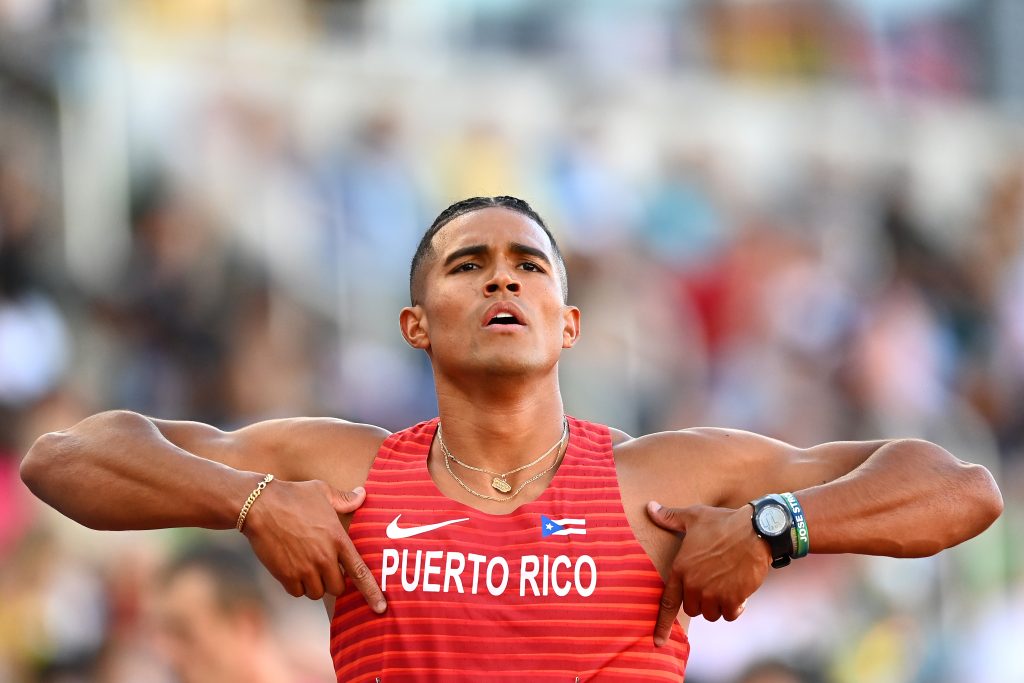
There were four 22-year-olds in the field, and they sat in first place, fourth place, fifth place and ninth place (Neugebauer), and the 20-year-old (Skotheim) in seventh. The world champion climbed another two places to 16th, while the world record holder dropped to sixth and the Olympic champion had gone. The competition had been turned on its head.
After Day 1
- Ayden Owens-Delerme 4606
- Pierce LePage 4485
- Zach Ziemek 4469
- Kyle Garland 4413
- Ash Moloney 4378
110M HURDLES
Day 2 was much sunnier and warmer than Day 1, and much more conducive for fast times in the hurdles. Johannes Erm opened the first heat with 14.38s, Ziemek 14.47s and Uibo a very good 14.49s. It wasn’t such a good run for Sander Skotheim, who was just outside 15 seconds.
In the second heat Ken Mullings of the Bahamas led the field with a PB of 14.02s, but significantly the defending world champion ran his fastest time ever – 14.27s. Kaul’s demeanour in Eugene was significantly different from in Ratingen and Götzis, where he had a beleaguered air about him. After a solid day one, he was continuing to climb the ranks stealthily, creeping another place up to 15th.
Onto the third heat, and it was crunch time for the world record holder Kevin Mayer. With Damian Warner no longer a factor, and Mayer by far the best hurdler in the field, this was one of his two remaining chances – the other being the pole vault – to stamp his authority on the field. A good time was essential.
But it didn’t happen, and Mayer only finished fourth overall, and only just under 14 seconds. Dan Golubovic nipped under 14s for the first time in 13.92s, while the overnight leader Owens-Delerme ran 13.88s. But suddenly Pierce LePage entered the conversation, so often there or thereabouts at the top of the table but hidden in the shadow of Warner. The Canadian ran 13.78s, a quarter of a second faster than ever before.
After six events
- Ayden Owens-Delerme 5596
- Pierce LePage 5488
- Zach Ziemek 5384
- Kyle Garland 5364
- Kevin Mayer 5357
DISCUS
With Pierce LePage gaining momentum, and a few weaker events on the way for Owens-Delerme, the next dynamic to observe was that between Zach Ziemek and Kevin Mayer. They are of similar standard in the discus and in the pole vault, although the Frenchman stronger in the javelin. If Ziemek were to throw further than Mayer, that would put him at an advantage going into the vault.
Mayer opened with 49.44, which would be his longest throw. Ziemek had two throws of around 45m, then improved to 48.40 in the final round. That was enough to hold off Mayer in the overall standings going into the pole vault.
Meanwhile, Jiri Sýkora was having a fantastic time. While he had the longest PB in the first group, it was only marginal – 52.92 to Mayer’s 52.38. In the second round, the Czech threw 53.67m which was just one cm short of Bryan Clay’s championship best. Then in the first round he threw a massive 54.39m, to set a new championships record.
Onto the second group. Lindon Victor, of course, threw a big one, 53.92m in the final round. That was to be expected. What wasn’t to be expected was Pierce LePage throwing a 1.80m PB of 53.26m.
Further back Kaul had a modest 44.62m, a few metres below his season’s best. Janek Õiglane’s progress was halted as he had problems with the discus and Ash Moloney also withdrew after the event. The field was down to 19.
After seven events:
- Pierce LePage 6427
- Ayden Owens-Delerme 6309
- Zach Ziemek 6221
- Kevin Mayer 6216
- Lindon Victor 6157
POLE VAULT
Now, time for the drama. The vault was the third of Kevin Mayer’s banker events, where he has the opportunity to build a significant gap over his rivals. That hadn’t happened in the shot. It hadn’t happened in the hurdles. The vault was his last chance…but there was one problem. The man one place ahead of him in the standings, Zach Ziemek, was his equal in the event.
However, that drama at 5.30m plus would have to wait while the lower heights were scaled. Ken Mullings was first underway at 4.10m in the lower group, and he would have a great vault, progressing to just one height short of his 4.60m PB.
In the higher group, Jiri Sýkora got things started at 4.60m. He had no-heighted at the Czech championships a few weeks earlier, and he came dangerously close to doing so again in Eugene. But he made it over on the third attempt, drama avoided. Onto 4.70m, where the German duo of Kai Kazmirek and Tim Nowak entered the competition. Kazmirek had cleared but Nowak logged two failures and was onto his final chance. On his third attempt, Nowak simply ran through. The vault has been Nowak’s nemesis over the last 12 months, first causing a bloody hand injury that thwarted his Olympic qualification chances, then biting him again in Eugene. If Jiri Sýkora had made the score Decathletes 1 – Pole Vault 0, the vault had fought back and made it 1-1.
But the vault wasn’t done yet. Sýkora had passed at 4.70m, so he returned for his first attempt at 4.80m. As he planted the pole and sailed into the air, the pole snapped in two places and hurled him onto the mat. Clutching his hand, he retired from taking any further vaults, thankfully with 4.60m in the bag, but with doubts as to whether he would be able to continue.
Four metres ninety came and went without incident, and so onto 5m, where the skyscrapers Kevin Mayer, Maicel Uibo and Zach Ziemek would enter. Ziemek cleared. Mayer and Uibo did not. They didn’t clear the second time either. So, while Double Z had gone over first time, we were treated to a double-dose of drama as the world record holder and the world silver medallist stared down the barrel of the gun signalling the potential demise of their decathlon. Both went over. For goodness’ sake, guys. Have a thought for those of us watching!
Uibo was the first to top out with a best of 5.30m, a height at which Ziemek had passed, and Mayer had cleared. If ZZ had gambled too much and didn’t make 5.40m, he was potentially handing Mayer the opportunity for a 60-point advantage. But both men made 5.40m, and both failed at 5.50m.
That made no changes to the 5-point differential between them, so if Kevin wanted this title, he was going to have to do it in the javelin.
In the other group, LePage had cleared just 5.00m which, while a season’s best, had reduced his lead over Ziemek and Mayer from over 200 points to just 80. Like many of the younger athletes in the field, Owens-Delerme’s vault is still improving, and so his best on the day of 4.50m dropped him down to fourth overall. Niklas Kaul cleared 4.80m, leaving himself too much to do from his final two events to reach the medals.
After eight events:
- Pierce LePage 7337
- Zach Ziemek 7256
- Kevin Mayer 7251
- Ayden Owens-Delerme 7069
- Lindon Victor 7006
JAVELIN
It is easy to forget how good a javelin thrower Kevin Mayer is. That’s in part because he tends to only do one decathlon a year, and in 2018 and 2019 he did not get that far in the competition in his major championships. When he does get as far as the ninth event, he can throw over 70m, but that also tends to be overshadowed by Niklas Kaul, the 80m-adjacent rocket launcher.
This would be the crunch event for the medals. On paper, Mayer was by far the best thrower, 73m to Ziemek’s 60.92m PB, which was in turn marginally better than LePage’s 58.24m. Looking ahead to the 1500m, LePage was the fastest, 4:31 to Ziemek’s 4:38. Ignoring Mayer’s recorded PB of 4:18, which he did when he was 20 and hadn’t yet broken 11 seconds for the 100m, something like 4:36 would be a much better estimate. And after having to scrap to get to this point, he sure as hell wasn’t going to want to run that fast.
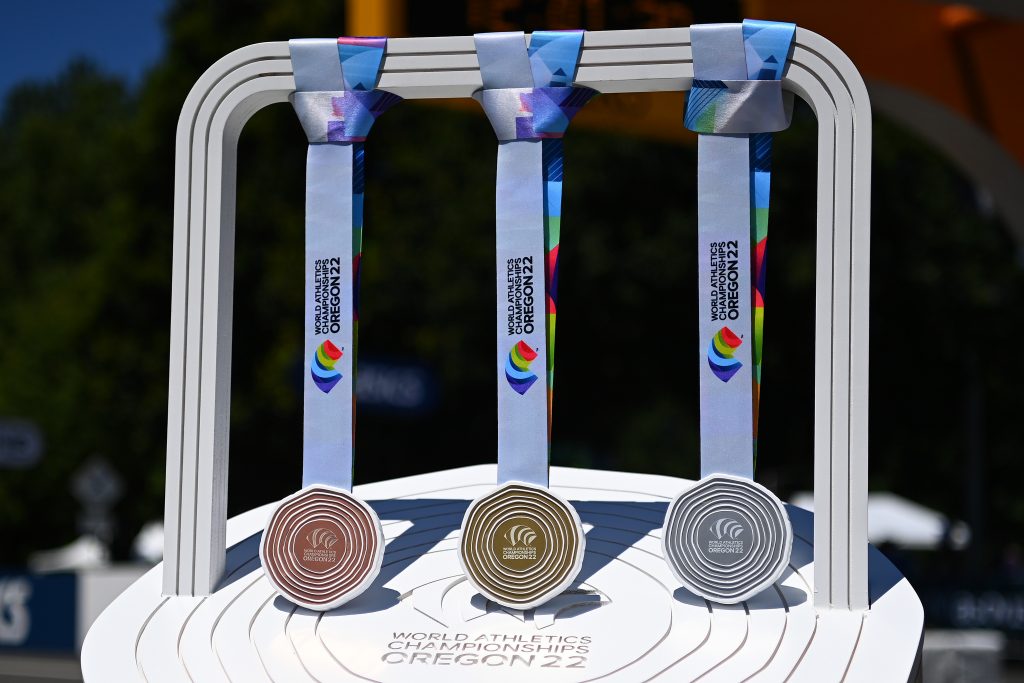
A big throw would give Mayer the buffer he needed, but LePage needed to stay as close to Ziemek as he could in the javelin, to avoid the American eliminating the advantage the Canadian had in the 1500m. “I have a few things up my sleeve for tomorrow” Ziemek told Decathletes of Europe on the end of Day 1. Would one of those be the javelin?
Group A went first, including a bandaged Sýkora returning to throw 61.49m – it would take more than a few injured fingers to deter the Czech – and also included Ziemek and Mayer. LePage would go in Group B.
Ziemek threw first, a solid 58.22m, and Mayer a few athletes later with 64.02m. Second round, and Ziemek threw a PB of 61.19m. He improved that to 62.18m in the third round, revealing what he had had hidden up his sleeve and setting the expectations for LePage. But the conversation was now about silver.
In the second round Mayer threw 70.31m. That was it. That was the gold medal.
Over to LePage in Group B, where Niklas Kaul was also throwing. Kaul was consistent, but about 10m down on where he was in 2019, and his series was 67.33m, 67.93m and 69.74m. LePage could not match Ziemek’s career best efforts, but he threw well, reaching a best of 57.52m in the second round.
After the javelin, the top three were already over 8000 points, as in the Olympics in 2021. There would be no 9000-point scores in Eugene, but even with the loss of the Olympic champion and the absence of the world leader, this was proving to be some decathlon.
After nine events:
- Kevin Mayer 8145
- Pierce LePage 8038
- Zach Ziemek 8027
- Lindon Victor 7838
- Maicel Uibo 7729
1500M
Mayer’s lead translated into a 15 second buffer to LePage and Ziemek, so long as he stayed on his feet and posted a respectable time, he was safe for gold.
For LePage and Ziemek, there was everything still to play for. Eleven points difference equated to about 1.5s. On paper it might seem that LePage, with his superior PB, would find that straightforward, but he was unsure of his fitness, having not had the opportunity to run a 1500m in competition since the Olympics a year ago. Ziemek, on the other hand, was in a position to win his first championship medal, and both had an eye on Ayden Owens-Delerme behind them.
The final two events of the decathlon were proving to be highly unusual. Niklas Kaul had not thrown the longest distance in the javelin, and he was not the fastest going into the 1500m. Ayden Owens-Delerme was the fastest in the field with his PB of 4:13.17 which he had run when setting his latest national record at the Mt Sac Relays.
From the gun Owens-Delerme hared away, a medal not technically impossible, but dependent on the performance of others and out of his hands. Kaul, neither a front-runner nor one to sit and kick, as usual took his time to wind up his pace. As the race progressed, Kaul moved beyond the pack – which included Tim Nowak who had continued in the competition after his no-height in the vault– and went in pursuit of Owens.
And the results were worth it for Kaul. With someone to chase, he was able to run a PB of 4:13.81 behind Ayden’s 4:13.02. A sliver ahead of his Mt Sac time for Owens, a two second improvement to his 2015 Grosseto time for Kaul.
For a moment, there was a pause as it looked like Owens-Delerme had been announced for bronze. But the electronic scoring, perhaps also momentarily distracted by this engrossing decathlon, sparked back into life and moved him to the correct place in fourth, in a national record of 8532, his third score over 8450 this year.
While Ayden and Niklas were slugging it out in the 4:10s, Johannes Erm was closest behind them in a three-second lifetime best of 4:25, emotionally drained on the track afterwards. But hang on, where was Steven Bastien? He was one of the fastest in the field and should have been shoulder to shoulder with Erm at 4:25, notwithstanding his decathlon hadn’t matched his performances of 2021.
Bastien was back in the field, pacing Zach Ziemek.
For those of the view that a staggered start in decathlon (Gundersen) would make it more exciting, think long and hard about what you are willing to sacrifice for that. Using the Gundersen approach, Bastien was 763 points behind Ziemek and so would have started 4 minutes and 27 seconds behind him. Ziemek would be in his last 100m when Bastien started his 1500m.
Instead, mirroring the Moloney-Dubler moment for which the world went mad in 2021, Bastien stayed with his teammate, spurring him on and giving him someone to follow to give him the best chance of beating LePage. But while teammates can provide moral support, they can’t run the race, and only LePage and Ziemek themselves could find that little extra pace.
For much of the race, LePage stayed on Ziemek’s shoulder, avoiding the scenario where he would go out hard, fade and then be caught on dying legs. Ziemek pushed on but could not shake the Canadian. And then LePage went in front, and the race was done. The medals were fixed.
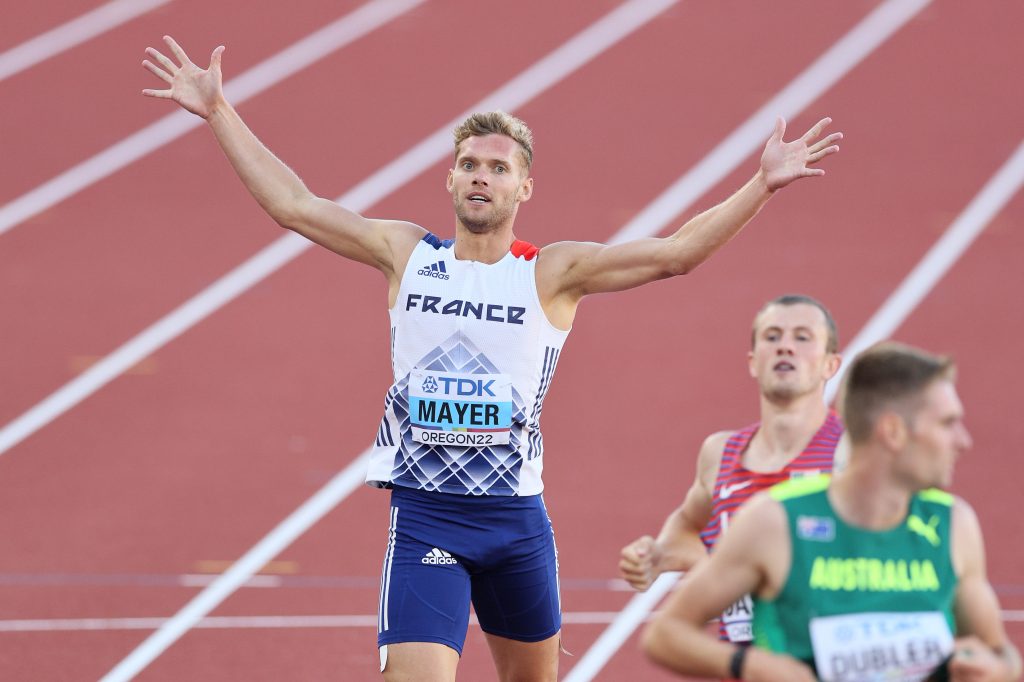
A Canadian and an American were on the podium, albeit not the duo that would have been predicted earlier in the year. And for the second year in a row, the world record holder Kevin Mayer had fought for his position, far from his best and unable to express himself 100%, but 100% one of the greatest decathletes of all time.
Final results:
- Kevin Mayer 8816
- Pierce LePage 8701 PB
- Zach Ziemek 8676 PB
- Ayden Owens 8532 NR
- Lindon Victor 8474
- Niklas Kaul 8434
- Maicel Uibo 8425
- Cedric Dubler 8246
- Johannes Erm 8227
- Leo Neugebauer 8182
- Kyle Garland 8133
- Kai Kazmirek 8113
- Jiri Sýkora 8107
- Dan Golubovic 8071
- Sander Skotheim 8062
- Steven Bastien 7939
- Ken Mullings 7866 NR
You can find the full results here.
WHAT THE ATHLETES HAD TO SAY
KEVIN MAYER: On being devastated at Damian’s withdrawal, the competition being so much harder than he thought after Damian withdrew, and when he can finally have a post-decathlon beer.
PIERCE LEPAGE: On coming back from injury in Tokyo, posting a big score while still below his best, and his duel with Zach Ziemek in the 1500
ZACH ZIEMEK: On his first global medal, losing his voice in front of the home crowd, and playing cat-and-mouse with Pierce LePage
LEO NEUGEBAUER: on joining his NCAA competitors Kyle Garland and Ayden Owens-Delerme at the World Championships, and his position as the top German coming into the competition:
“I really like those guys, I’ve been with them for so long now. It’s actually always been us three in the top in the NCAA, and now us three being here just feels great. Seeing familiar faces and not just new faces, it’s awesome. Germany has always been such a great decathlon culture, and being in the top this year, it feels really great, it feels like reward for all the hard work.”
SANDER SKOTHEIM: on competing at the World Championships in his first year as a senior, making the transition to the senior implements in the decathlon, and his thoughts on Markus Rooth’s NR as a target in Munich.
“A very good first day, some ups and downs, but the ups were very up and the downs were not too bad. All in in all a solid day one, just 30 points behind my PB. The second day, I woke up and I felt absolutely terrible! I had no juice in the legs, and I definitely felt that in the hurdles. And after that I just tried to refocus. I had to borrow some poles, so the pole vault was a bit of a struggle, because the poles ended up being a little too soft. Discus was a little agonising because of a small little foul I didn’t even feel myself. And then in the 1500m…when I saw Kevin on my side I thought, I have to beat Kevin Mayer!”
“I feel the transition has gone well. I struggle a little bit on the high hurdles, the shot put is not good but that’s just because I’m not the best in the shot. I feel like I’m starting to get the hang of the discus, but the hurdles is the biggest one – it’s like night or day whether or not I get a good race. Hopefully over the years I can get more consistent and drop more equal times every time.”
On another 8000-point score: “I’m very happy with that, 8000 is a good level. Three decathlons this year and three over 8000, so I’m very happy with that consistency. Hopefully, I can put it all together in Euros.”
And is Markus Rooth’s NR a target for Munich? “Definitely – but he’ll be there too! So hopefully we can push ourselves together towards maybe 8400.”
JIRI SYKORA: on the pole vault drama, coming so close to his PB despite the incident, and his hopes for the European Championships
“I broke the pole, it made some cuts on my fingers, but I hope nothing is broken. I didn’t know what I can make on the javelin – I think I was still in shock after the pole vault, both in javelin and still in the 1500m. I hope there’s a chance for Munich, because I really want to make this chance for some really good results.”
KEN MULLINGS: on becoming the new Bahamian national record holder
